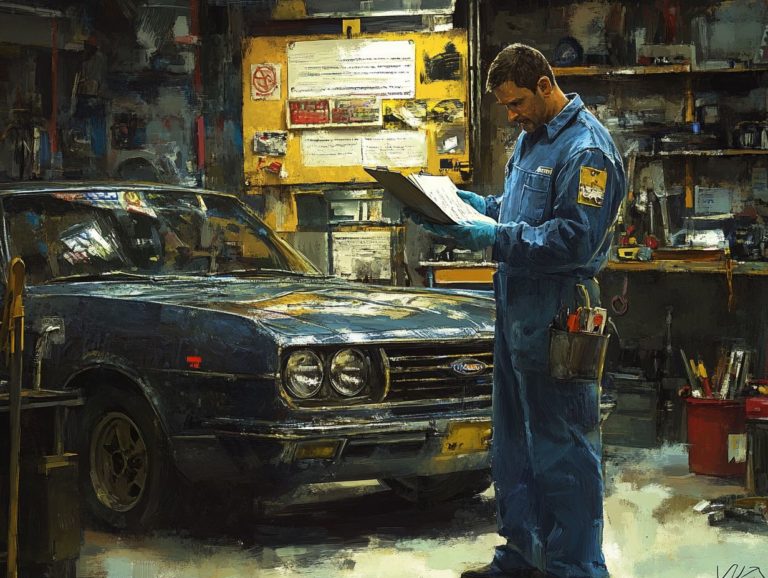What to Know About Used Car Depreciation
Car depreciation can have a substantial effect on your finances, whether you re in the market to buy or sell a vehicle.
Grasping the mechanics of depreciation is essential for making informed choices. This article delves into the definition of depreciation, the various factors that influence it, and its impact on used car prices.
You ll find practical tips for managing depreciation through proper maintenance and upkeep. Additionally, we ll provide you with strategies aimed at maximizing your vehicle’s resale value.
Get ready to master used car depreciation and make smart choices!
Contents
- Key Takeaways:
- Understanding Car Depreciation
- How Depreciation Affects Used Car Prices
- Tips for Managing Depreciation
- Factors to Consider When Buying a Used Car
- Maximizing Resale Value
- Frequently Asked Questions
- What determines the rate of depreciation for a used car?
- How much value does a used car lose over time?
- Does the mileage of a used car affect its depreciation rate?
- How can I minimize the impact of depreciation on a used car?
- Can I negotiate the price of a used car based on its depreciation?
- Is it worth buying a used car with high depreciation?
Key Takeaways:

- Car depreciation is the decline in value of a vehicle over time and is affected by factors like age, mileage, and condition.
- Understanding and calculating depreciation can help you make informed decisions when buying or selling a used car.
- Regular maintenance and upkeep can help slow down depreciation and maximize the resale value of a used car.
Understanding Car Depreciation
Understanding car depreciation is essential for you as it offers valuable insight into how much value your vehicle loses over time. This knowledge can significantly influence your decisions regarding purchasing, maintaining, and even selling your car.
Factors such as the make and model of the vehicle and the total miles driven play crucial roles in determining depreciation rates. The overall health of the automotive industry also impacts these rates. These rates can vary significantly across different vehicles and market conditions, making it vital for you to stay informed.
Definition and Factors Affecting Depreciation
Car depreciation refers to the gradual decline in a vehicle’s value over time, shaped by many factors that can influence its worth think mileage, fuel economy, and any blemishes on its exterior.
Along with these aspects, the car s age is a key player in this value equation. Typically, the early years are when you ll witness the most significant drops in worth.
The make and model are also crucial factors in this depreciation dance. For instance, luxury vehicles may start with a glamorous price tag but often depreciate faster due to higher ownership costs and niche appeal.
On the flip side, brands renowned for reliability, like Honda or Toyota, usually manage to hold onto their value better over time. This is largely thanks to their reputation for durability and lower maintenance expenses.
External market conditions, like economic changes and fuel prices, can also increase depreciation effects, impacting various vehicle types in different ways.
How Depreciation Affects Used Car Prices
The depreciation of a vehicle profoundly affects the prices of used cars in the marketplace. As you navigate this landscape, consider factors like the car’s age, condition, and current market demand.
These elements come together to shape its resale value and determine its appeal to buyers in search of reliable options.
Calculating Depreciation and Market Value

Calculating depreciation is crucial for grasping a car’s value in the used car market. You’ll often find yourself turning to resources like Kelley Blue Book and Edmunds to pinpoint accurate market values based on various key factors.
These platforms offer estimates that consider the vehicle’s make, model, year, condition, and mileage elements that are vital in the depreciation equation.
To truly assess a car’s worth, it’s essential to factor in additional aspects such as its service history, any modifications made, and local market trends that may influence resale prices.
By applying this comprehensive information, you can make informed decisions as both a buyer and a seller that reflect not only the raw numbers but also the actual condition and desirability of the vehicle at hand.
Tips for Managing Depreciation
Effectively managing car depreciation allows you to minimize your vehicle expenses and maximize your investment throughout your ownership journey.
This involves strategic maintenance and informed repair decisions that work to preserve your car’s value over time.
Maintenance and Upkeep Strategies
Implementing effective maintenance and upkeep strategies is essential for preserving the value of your car. This is especially important if you’re considering certified pre-owned options. A focus on maintenance correlates directly with your vehicle’s reliability and offers long-term financial savings.
Routine inspections are key. They allow you to catch potential issues before they escalate, enabling timely repairs that ensure safe operation and maintain your car’s aesthetic and functional integrity.
Follow the manufacturer’s guidelines. Scheduled oil changes and tire rotations help you avoid premature wear and tear. These proactive steps boost your vehicle’s performance and enhance its resale value, making it more appealing to prospective buyers.
A well-maintained car radiates reliability and care, leading to better offers and a stronger return on your investment.
Factors to Consider When Buying a Used Car
When you re in the market for a used car, several factors will influence your decision-making process.
Check the car s make and model; brands like Toyota and Honda often stand out. Also, examine its depreciation history. Knowing how a vehicle holds its value is crucial.
Don’t overlook car insurance costs. These can fluctuate significantly based on the type of vehicle you choose. Each of these elements plays a vital role in shaping your final decision.
Impact of Depreciation on Purchase Decision

Depreciation is a pivotal factor in your car-buying journey. Understanding how various vehicles retain their value, along with what to know about used car recalls, can guide you toward a model with superior long-term resale potential.
Many find it unsettling to see a significant portion of their investment dwindle over the years. Research shows that certain brands, such as Toyota and Subaru, typically hold their value better than others due to their reputation for reliability and strong market demand.
This insight helps you look beyond the initial sticker price to consider how a car s resale value may evolve over time. Market demand fluctuations can greatly affect depreciation rates, making it essential to stay informed and adopt a long-term perspective.
Maximizing Resale Value
Maximizing resale value requires strategic tactics to minimize depreciation. This ensures your vehicle remains an appealing choice, whether you opt for a private sale or decide to trade it in at a dealership.
Tactics for Minimizing Depreciation and Increasing Value
To minimize depreciation, make wise vehicle choices and commit to regular maintenance. Both factors contribute to lower overall expenses and extend the lifespan of reliable cars, enhancing their value during long-term ownership.
Choose vehicles known for durability and low maintenance costs to significantly impact resale value. By following a regular servicing schedule, you can identify minor issues before they escalate, ensuring your car remains in excellent condition.
This smart approach boosts performance and makes your car irresistible to buyers! Keep your car clean inside and out, and promptly address any cosmetic damage to make a notable difference.
Ultimately, these practices create a positive narrative about your vehicle’s history, making it more appealing to those seeking a dependable used car.
Frequently Asked Questions
What determines the rate of depreciation for a used car?

The rate of depreciation for a used car is determined by several factors. These include the make and model, age, mileage, condition, and market demand. Generally, luxury cars and popular models tend to depreciate faster than more affordable or niche vehicles.
How much value does a used car lose over time?
The amount of value a used car loses over time varies greatly. However, on average, cars can depreciate anywhere from 15% to 25% in the first year and about 10% to 15% each year thereafter.
Does the mileage of a used car affect its depreciation rate?
Yes, the mileage of a used car impacts its depreciation rate. More miles mean a lower value because they often indicate more wear and tear.
This can lead to potential problems with the car’s parts and a shorter lifespan.
How can I minimize the impact of depreciation on a used car?
To reduce depreciation, buy a reliable and popular model. Maintain it well and avoid driving too many miles.
Consider choosing a certified pre-owned car. These often come with a warranty and have been thoroughly checked by the manufacturer.
Can I negotiate the price of a used car based on its depreciation?
Yes, you can negotiate a used car’s price based on its depreciation. Knowing the estimated depreciation for that specific model gives you an edge in bargaining.
Use the car’s condition, mileage, and any needed repairs as leverage to secure a better deal.
Is it worth buying a used car with high depreciation?
This depends on your situation and needs. A highly depreciated car might be a good choice if you plan to keep it for a short time or if you find a great deal.
However, if you want to hold onto the car for a long time, consider one with lower depreciation to save on overall costs.






